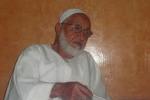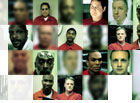 |
 |
| Sheikh Abd al-Rahim Jibril |

|
EGYPT: 17 PRISONERS EXECUTED FOR 2013 ATTACK ON POLICE
April 28, 2021: Egyptian authorities on 26 April 2021 hanged 17 people who were convicted of murder for an attack on a police station in 2013, lawyers representing their families have said.
Egypt's Ministry of Interior said in a statement on 26 April that nine men who were found guilty of attacking a police station in the town of Kerdasa were executed, but on 27 April lawyers representing the families of 17 defendants said all of the men were executed.
The executions took place in the Wadi Natrun prison complex in the Nile Delta province of Beheira, the officials said.
Rights groups had previously raised concerns over the legitimacy of the trials and stated that there was little evidence linking those executed with the attack on the police station.
Over 180 people were initially sentenced to death over the attack - one of the worst to occur on police in recent years. However, many had their convictions reduced or appealed.
Three other men in the same case were executed on 4 October 2020.
The killing of the 13 policemen, which later became known as the Kerdasa massacre, came hours after Egyptian security forces stormed mass sit-ins in support of ousted former President Mohamed Morsi, in the Rabaa Square massacre.
Protesters were demanding the reinstatement of Morsi as president.
The violent dispersals at Cairo's Rabaa al-Adawiya and al-Nahda squares have been called one of the largest killings of demonstrators in a single day by rights groups.
According to Amnesty International, one of the men executed on 26 April was an 82-year-old who local media identified as a Quran teacher in poor health.
Online, many social media users used the deceased man's name, Sheikh Abd al-Rahim Jibril, to highlight his execution and demand justice.
According to the International Quran News Agency (IQNA), the 16 other prisoners were: Walid Saad Abu Omaira, Mohamed Rizk Abuel Soud, Ashraf Sayed Rizk, Ahmed Owes Hussein, Essam Abdel Moety, Ahmed Abdel Nabi, Badr Abdel Nabi, Qutb Sayed Qutb, Omar Mohamed El-Sayed, Izzat Al-Attar, Ali El-Sayed Kenawy, Abdullah Saeed, Mohamed Yousef Al-Seidi, Ahmed Abdel Salam, Arafat Abdel Latif, Mustafa El-Sayed El-Kerfesh.
Many of the prisoners were suspected members of the Muslim Brotherhood group, Egypt's best-organized opposition movement for decades. The group won a series of elections after the Arab Spring uprising in 2011 ended President Hosni Mubarak's nearly three-decade rule.
But Morsi, a senior Brotherhood figure elected in 2012, proved divisive, and the military removed him from power amid mass protests against his rule a year later.
Since then, authorities have waged an expansive crackdown on Islamists, arresting and detaining thousands and sentencing them to harsh prison terms.
Egypt's government has declared the Muslim Brotherhood a terrorist group. (Sources: AP, Amnesty International, 26/04/2021; MEE, 27/04/2021; IQNA, 28/04/2021)
|

